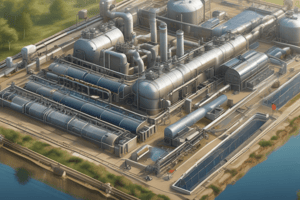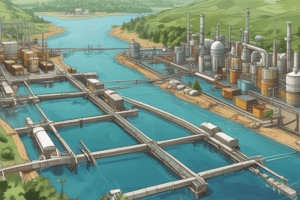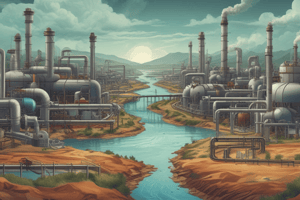Podcast
Questions and Answers
Which type of compounds can be found as contaminants in wastewater?
Which type of compounds can be found as contaminants in wastewater?
- Organic and inorganic compounds (correct)
- Inorganic compounds only
- Organic compounds only
- Metals only
What is a common example of an organic biodegradable pollutant found in wastewater?
What is a common example of an organic biodegradable pollutant found in wastewater?
- Glucose (correct)
- Nitrogen
- Lead
- Mercury
How do excess nutrients from wastewater contribute to eutrophication?
How do excess nutrients from wastewater contribute to eutrophication?
- By decreasing water temperature
- By promoting algal blooms that deplete oxygen levels (correct)
- By increasing dissolved oxygen levels in water bodies
- By reducing pH levels in water bodies
Which of the following is NOT a common pollutant found in wastewater?
Which of the following is NOT a common pollutant found in wastewater?
What type of contaminants include heavy metals like lead and mercury?
What type of contaminants include heavy metals like lead and mercury?
What is the main concern related to heavy metal pollution in wastewater?
What is the main concern related to heavy metal pollution in wastewater?
Which treatment process is focused on removing residual pollutants like heavy metals from wastewater?
Which treatment process is focused on removing residual pollutants like heavy metals from wastewater?
What is the main challenge associated with public acceptance of recycled water for irrigation purposes?
What is the main challenge associated with public acceptance of recycled water for irrigation purposes?
Which technology is used in advanced treatment to produce high-quality water for potable purposes?
Which technology is used in advanced treatment to produce high-quality water for potable purposes?
Why might investing in advanced wastewater recycling technologies be challenging for small communities and developing countries?
Why might investing in advanced wastewater recycling technologies be challenging for small communities and developing countries?
Study Notes
Chemistry of Waste Water: Contaminants and Recycling
Water is a fundamental resource for life, and as societies grow and produce, the amount of wastewater generated also increases. This article will explore the chemistry of wastewater, with a focus on contaminants present and the recycling efforts to mitigate their impact.
Pollutants in Wastewater
Wastewater originates from various sources, such as municipal sewage, industrial discharge, and agricultural runoff. Contaminants in wastewater can be organic (carbon-based) or inorganic (non-carbon-based), dissolved or suspended, and toxic or non-toxic. Some common pollutants include:
- Organic compounds: Biodegradable (e.g., glucose, ethanol) and non-biodegradable (e.g., polycyclic aromatic hydrocarbons, pesticides)
- Inorganic compounds: Heavy metals (e.g., lead, mercury, cadmium), nutrients (e.g., nitrogen, phosphorus), and salts (e.g., sodium chloride)
- Microorganisms: Pathogens (e.g., bacteria, viruses, protozoa), and non-pathogens (e.g., algae, fungi)
- Suspended solids: Particles from sewage, industrial processes, and agricultural runoff
Effects of Pollutants on the Environment
Pollutants in wastewater can have detrimental effects on the environment and human health. For example:
- Eutrophication: Excess nutrients from wastewater can lead to algal blooms, which deplete dissolved oxygen in water bodies and result in fish kills and other ecological damages.
- Heavy metal pollution: Toxic heavy metals can accumulate in aquatic organisms and the food chain, leading to poisoning and disease in humans and wildlife.
- Pathogen contamination: Pathogens can lead to waterborne diseases, pose risks to aquatic life, and contaminate drinking water sources.
Techniques for Recycling Wastewater
Recycling wastewater can help reduce pollution and conserve water resources. Various techniques can be employed to treat and reuse wastewater, depending on the quality requirements and intended application:
- Primary treatment: Removes suspended solids and floatables using physical processes such as sedimentation, screening, and flotation.
- Secondary treatment: Removes biodegradable organic matter through biological processes such as activated sludge, trickling filters, and suspended growth systems.
- Tertiary treatment: Removes residual pollutants such as heavy metals, nutrients, and residual organic matter by using physical, chemical, or biological methods.
- Advanced treatment: Produces high-quality water suitable for potable, industrial, or irrigation purposes using techniques such as reverse osmosis, nanofiltration, and advanced oxidation processes.
Challenges and Future Prospects
Despite advancements in wastewater treatment and recycling technologies, challenges remain in ensuring sustainable water management. Some of these include:
- Cost: Investing in advanced wastewater recycling technologies can be expensive, and small communities and developing countries may not have the financial capacity to develop such infrastructure.
- Public acceptance: Public perception and acceptance of recycled water in various applications, such as irrigation, may pose challenges.
- Regulatory frameworks: Developing and implementing effective regulatory frameworks for wastewater management and recycling is crucial to protect the environment and human health.
In conclusion, understanding the composition of pollutants in wastewater and developing efficient recycling techniques are essential for protecting the environment, promoting sustainable water management, and ensuring water safety. By embracing advanced wastewater treatment technologies and promoting public acceptance, we can mitigate the negative impacts of wastewater on the environment and human health and secure a sustainable future.
Studying That Suits You
Use AI to generate personalized quizzes and flashcards to suit your learning preferences.
Description
Explore the chemistry of wastewater, focusing on contaminants like organic and inorganic compounds, microorganisms, and suspended solids. Learn about the detrimental effects of pollutants on the environment and human health, along with techniques like primary, secondary, tertiary, and advanced treatments for recycling wastewater.




